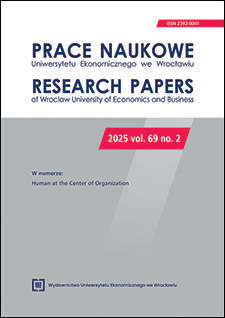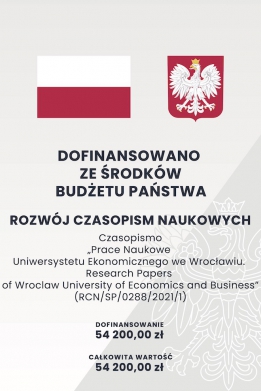Well-being washing – iluzoryczna troska o pracowników w organizacji
DOI:
https://doi.org/10.15611/pn.2025.2.08Słowa kluczowe:
dobrostan w miejscu pracy, well-being washing, zasoby ludzkie, interwencja, zdrowie psychiczneAbstrakt
Cel: Artykuł ma na celu przybliżenie zjawiska well-being washing, opisanie jego objawów i skutków dla pracowników i organizacji oraz wskazanie kluczowych elementów skutecznej, holistycznej strategii dobrostanu.
Metodyka: Przedstawiono wyniki zogniskowanego wywiadu grupowego (FGI) z 8 pracownikami dużych firm różnych branż w Polsce. Uczestnicy oceniali praktyki well-beingowe w swoich organizacjach, diagnozując także symptomy well-being washing.
Wyniki: Badanie wykazało powszechność powierzchownych, niespójnych z celami biznesowymi działań w zakresie dobrostanu. Większość inicjatyw miała charakter jednorazowy i nie stanowiła części spójnej strategii.
Implikacje i rekomendacje: Wyniki ukazują negatywne skutki well-being washing i wskazują na ko-nieczność tworzenia autentycznych, kompleksowych strategii dobrostanu. Przyszłe badania powinny identyfikować skuteczne interwencje wspierające rzeczywiste zaangażowanie organizacji w ten obszar.
Oryginalność/wartość: Artykuł podejmuje rzadko omawiany temat well-being washing, ujawniając jego skalę i konsekwencje. Dzięki analizie praktyk organizacyjnych podkreśla znaczenie autentyczności i zgodności działań well-beingowych z rzeczywistymi potrzebami pracowników.Pobrania
Bibliografia
Adams, J. M. (2019). The Value of Worker Well-Being. Public Health Reports, 134(6), 583-586. https://doi.org/10.1177/0033354919878434
Amabile, T. M., Barsade, S. G., Mueller, J. S., & Staw, B. M. (2005). Affect and Creativity at Work. Administrative Science Quarterly, 50(3), 367-403. https://doi.org/10.2189/asqu.2005.50.3.367
Bloor, M., Frankland, J., Thomas, M., & Robson, K. (2001). Focus Groups in Social Research. SAGE Publications. https://doi.org/10.4135/9781849209175
Braun, V., & Clarke, V. (2012). Thematic Analysis. In H. Cooper, P. M. Camic, D. L. Long, A. T. Panter, D. Rindskopf, & K. J. Sher (Eds.), APA Handbook of Research Methods in Psychology, Vol. 2. Research Designs: Quantitative, Qualitative, Neuropsychological, and Biological (pp. 57–71). American Psychological Association. https://doi.org/10.1037/13620-004
Cholteeva, Y. (2022). More Than a Third of Businesses are 'Wellbeing Washing', Study Shows. People Management, CIPID. Retrieved March 2, 2024, from https://www.peoplemanagement.co.uk/article/1803077/third-businesses-wellbeing-washing-study-shows
Claro Wellbeing. (2023). Wellbeing Washing – The True Cost. Retrieved March 5, 2024, from https://blog.clarowellbeing.com/one-in-three-firms-wellbeing-washing
de Oliveira, C., Saka, M., Bone, L. Jacobs, R. (2023). The Role of Mental Health on Workplace Productivity: A Critical Review of the Literature. Applied Health Economics and Health Policy, 21(2), 167-193. https://doi.org/10.1007/s40258-022-00761-w
Deloitte. (2023). Gen Z and Millennial Survey. Waves of Change: Acknowledging Progress, Confronting Setbacks. Retrieved March 4, 2024, from https://www.deloitte.com/global/en/issues/work/content/genzmillennialsurvey.html
Dewe, P., & Cooper, C. L. (2020). Work and Stress: A Research Overview (1st ed.). Routledge.
Fisher, C. D. (2014). Conceptualizing and Measuring Wellbeing at Work. In C. L. Cooper (Ed.), Wellbeing. https://doi.org/10.1002/9781118539415.wbwell018
Flash Eurobarometer 530. (2023). Mental Health, Ipsos European Public Affairs. Retrieved March 1, 2024, from https://health.ec.europa.eu/publications/mental-health-0_en
Fleming, W. J. (2023). Employee Well-Being Outcomes from Individual-Level Mental Health Interventions: Cross-Sectional Evidence from the United Kingdom. Industrial Relations Journal, 55, 162-182. https://doi.org/10.1111/irj.12418
Gawlik, K. (2018). Focus Group Interviews. In M. Ciesielska & D. Jemielniak (Eds.), Qualitative Methodologies in Organisation Studies. Palgrave Macmillan. https://doi.org/10.1007/978-3-319-65442-3_5
Guest, D. E. (2017). Human Resource Management and Employee Well-Being: Towards a New Analytic Framework. Human Resource Management Journal, 27, 22-38. https://doi.org/10.1111/1748-8583.12139
Harter, J. K., Schmidt, F. L., & Hayes, T. L. (2002). Business-Unit-Level Relationship between Employee Satisfaction, Employee Engagement, and Business Outcomes: A Meta-Analysis. Journal of Applied Psychology, 87(2), 268-279. https://doi.org/10.1037/0021-9010.87.2.268
IOSH. Institution of Occupational Safety and Health. (2024). Workplace Wellbeing. The Role of Line Managers in Promoting Positive Mental Health. Retrieved March 5, 2024, from https://iosh.com/guidance-and-resources/professionals/technical-guides-and-research/workplace-wellbeing
ManPowerGroup. (2024). Raport: Niedobór talentów. Retrieved March 6, 2024, from https://raportyhr.manpowergroup.pl/niedobor-talentow-2023
Molek-Winiarska, D., & Mikołajczyk, K. (2022). Case Studies of Well-Being Practices in Companies during the Pandemic. Scientific Papers of Silesian University of Technology – Organisation and Management Series, 159, 305-316. http://dx.doi.org/10.29119/1641-3466.2022.159.24
Richardson, N., & Antonello, M. (2023). People at Work 2023: A Global Workforce View. ADP Research Institute. Retrieved March 1, 2024, from https://www.adpri.org/assets/people-at-work-2023-a-global-workforce-view/
Rosendahl, N. (2021). The 7 Sins of “Wellbeing Washing” – When Talk and Actions Don’t Match. Hintsa. Retrieved March 3, 2024, from https://www.hintsa.com/insights/blogs/7-sins-of-wellbeing-washing/
Seligman, M. E. P. (2011). Pełnia życia. Nowe spojrzenie na kwestię szczęścia i dobrego życia. Media Rodzina.
WHO. World Health Organization. (2022). Mental Health at Work. Retrieved March 7, 2024, from https://www.who.int/news-room/fact-sheets/detail/mental-health-at-work
Wright, T. A., & Bonett, D. G. (2007). Job Satisfaction and Psychological Well-Being as Nonadditive Predictors of Workplace Turnover. Journal of Management, 33(2), 141-160.
ZUS. Zakład Ubezpieczeń Społecznych. (2023). Absencja chorobowa w 2022 roku. Retrieved March 4, 2024, from https://www.zus.pl/baza-wiedzy/statystyka/opracowania-tematyczne/absencja-chorobowa
Pobrania
Opublikowane
Licencja
Prawa autorskie (c) 2025 Katarzyna Mikołajczyk

Utwór dostępny jest na licencji Creative Commons Uznanie autorstwa – Na tych samych warunkach 4.0 Miedzynarodowe.
Accepted 2024-11-28
Published 2025-07-22









